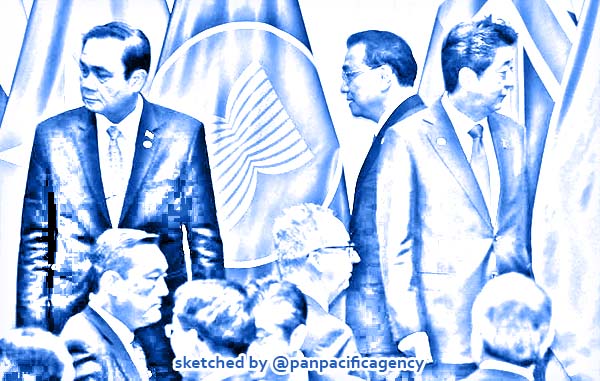RCEP agreement on track to be signed by year-end: Singapore’s minister

China's Premier Li Keqiang passes Japan's Prime Minister Shinzo Abe, with Thai Prime Minister Prayut Chan-o-cha looking on, as they gather for a group photo with Asean leaders at the Regional Comprehensive Economic Partnership (RCEP) meeting in Singapore Nov 14, 2018. (Reuters file photo). Sketched by the Pan Pacific Agency.
SINGAPORE, May 3, 2020, The Straits Times. The Regional Comprehensive Economic Partnership (RCEP) trade agreement remains on track to be signed by year-end, Trade and Industry Minister Chan Chun Sing said in an interview on Sunday (May 3) during which he stressed the importance of international cooperation amid the Covid-19 pandemic, The Straits Times reported.
“Everyone agrees that it’s really important for us to sign the RCEP this year to bolster the confidence of the global economy and the regional economy, especially in such a difficult moment,” Mr Chan told reporters during the virtual interview.
“At this point in time, we are still on track for the signing by the RCEP countries at the end of the year,” he said.
The RCEP is set to be the world’s largest trade pact, and involves 15 countries: all 10 Asean nations, as well as Australia, China, Japan, New Zealand, and South Korea. India withdrew from the deal last year.
Providing an update, Mr Chan said that an offer has been made to India to rejoin discussions in the coming month.
“If India is unable to rejoin the discussions in the coming month, then the plans will continue to proceed with the legal scrubbing for the preparation for the signing at the end of the year,” said Mr Chan.
Intensive virtual meetings have been ongoing, he said, adding that no significant delays were foreseen in the signing of the agreement.
He also said developments would have to be taken into account to see if the signing could proceed in a meeting or in a different way.
Mr Chan said that he and his counterparts from other nations agree that recovery from the current crisis will require long-term cooperation.
“We need to not just manage the current situation, which is the fallout from the Covid-19 pandemic, but we also need to give confidence for the longer term economic prospects for our regional countries,” he said.
This will require doing “new things to allow our economies to recover and to grow”, such as by participating in more regional agreements, said Mr Chan.